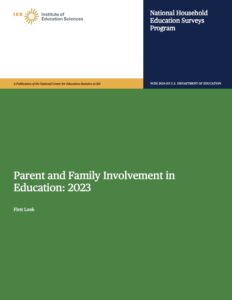 The United States Department of Education has released the most recent edition of their Parent and Family Involvement in Education report. The study outlines racial differences in parents’ involvement in children’s activities and school meetings, their satisfaction with school characteristics, and their communication with teachers and school officials throughout the 2022-2023 academic year.
The United States Department of Education has released the most recent edition of their Parent and Family Involvement in Education report. The study outlines racial differences in parents’ involvement in children’s activities and school meetings, their satisfaction with school characteristics, and their communication with teachers and school officials throughout the 2022-2023 academic year.
Among the findings included in the report are:
- Nearly half of parents with Black children received school-initiated phone calls about their children at some point during the school year, compared to only 36 percent of parents with White children.
- The overall mean number of school meetings attended by parents of Black children was 5, compared to a mean of 7 for parents of White children.
- Parents of Black children and parents of White children attended general PTA meetings and class events at roughly the same rate, but parents of Black children were less likely to participate in school fundraising or volunteer events.
- Some 37 percent of parents of Black children attended meetings with school guidance counselors, compared to only 26 percent of parents with White children.
- While the majority of all parents were satisfied with their children’s school characteristics, parents of Black children were less likely than parents of White children to report satisfaction with their child’s school, their teachers, their academic standards, the school’s discipline practices, and how the school staff interacted with parents.
- Parents across all racial backgrounds listed quality of their child’s teachers and school safety as the most important factors when determining what schools their students should attend. Some 84 percent of parents with Black children considered school safety as “very important” – the highest rate among all racial groups, and seven percentage points higher than the share of parents with White children.
- Regarding non-school activities, parents of Black children and parents of White children attended events at very similar levels. The largest difference in after-school activity attendance was found among community, religious, and ethnic events. Parents of Black children attended these events at a rate of 52 percent compared to 45 percent of parents with White children.
- Roughly 6.4 percent of White children were homeschooled, compared to 5.1 percent of Black children. However, among children who were homeschooled, Black children were significantly more likely to take full-time virtual classes.











